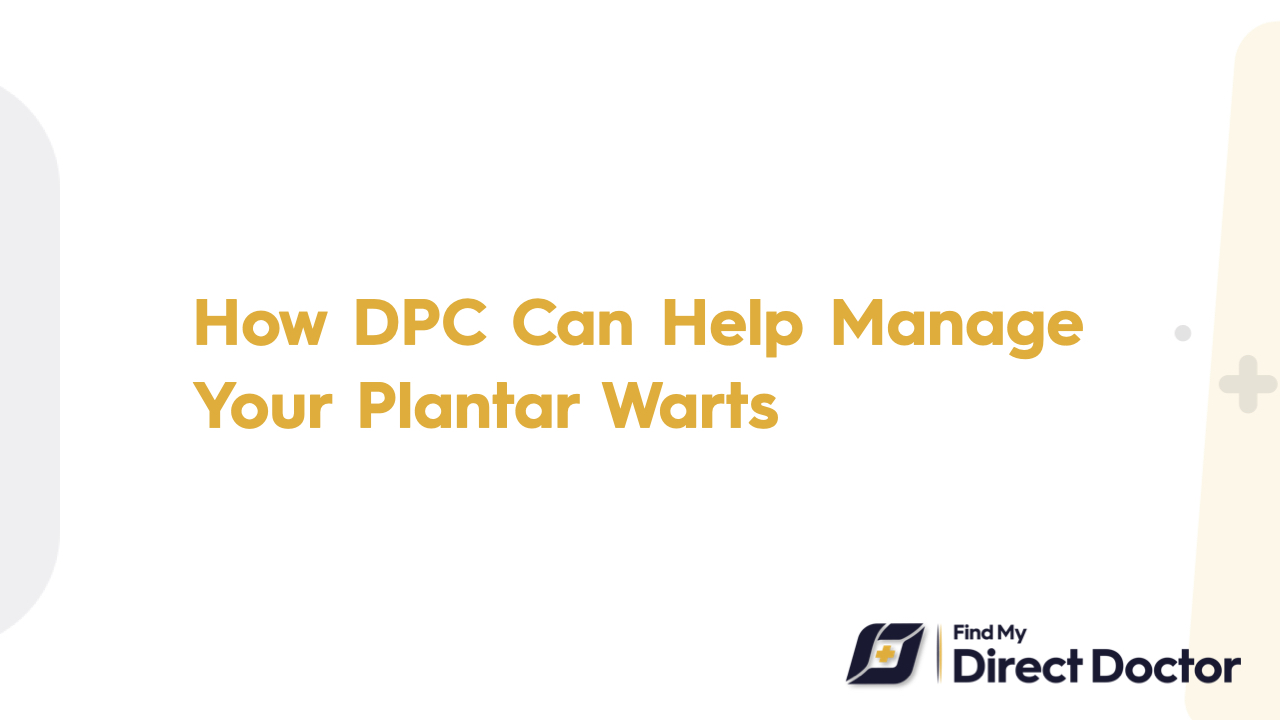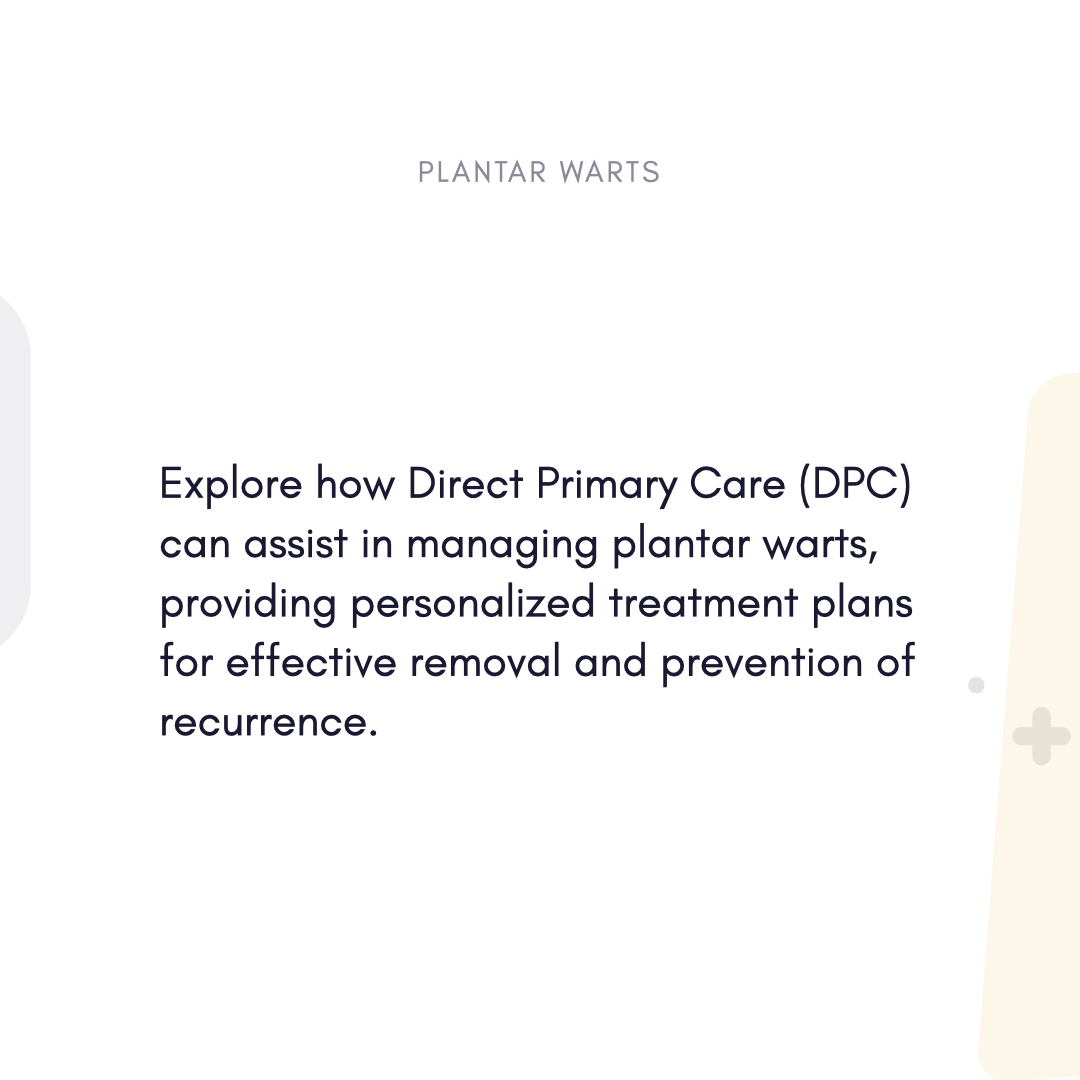Plantar Warts and Direct Primary Care (DPC): Step-by-Step Relief Without the Hassle
Every step causes a painful rough, callused bump on your heel. Shame preventing you from going barefoot. For 10% of those with plantar warts, this HPV infection is not only a nuisance but also a tenacious invader resistant to over-the-counter treatments. Although traditional treatment usually consists of expensive, sporadic clinic visits, Direct Primary Care (DPC) offers zap warts and prevent recurrence consistent, customized treatment.

A Knowledge of Plantar Warts
HPV strains that live on weight-bearing areas of the foot cause plantar warts. Important qualities:
- Hard, grainy lesions including black "seeds," or clotted capillaries
- Agony when standing or walking
- Clustered development, sometimes known as mosaic warts
Warts without management: risks
- Distributed among other body parts or household members.
- Secondary infections from picking permanent scars from demanding treatments
Early, aggressive treatment advised by the American Academy of Dermatology helps to avoid chronicity.
DPC Changes Everything Wart Treatment for Plants
Operating on a membership model usually ranging from 50 USD to 100 USD per month, Direct Primary Care (DPC) provides unlimited access to your doctor for a fixed price. For those with warts, this means no insurance hassles, no co-pays, and a treatment schedule as relentless as your warts.
1. Fast Targeted Treatment and Diagnosis
DPC's easily available approach guarantees:
- Same-day warts for either new or recurrent ones.
- Procedures performed in-office either electrocautery or cryotherapy (-196°C liquid nitrogen).
- Topical prescriptions call for either 5-fluorouracil cream or 40% strong salicylic acid.
2. Customised, Multimodal Treatment
DPC doctors design customized plans compliant with dermatology recommendations:
- Strategies to boost immunity: oral zinc or intralesional candida antigen injections.
- Custom compound creams—such as salicylic acid + cantharidin—for home care kits.
- Preventive education: recommendations for shower shoes, foot hygiene practices.
3. Comprehensive, reasonably priced assistance
DPC lowers recurrence and financial risk by:
- Cryotherapy for as low as 20 USD/session costs less than 150 USD+ elsewhere.
- 24/7 telehealth access helps control new outbreaks or blistering post-treatment.
- Family-wide care: Discounted housemates' screenings.
DPC Benefits for Plantar Wart Patients
1. Unmatched Approachability
- Weekly cryotherapy treatments until resolution; no delays in appointments.
- Dermatologist-grade treatments like immunotherapy do not wait for referrals.
2. Customized Actions
- Children have easier options than adults: duct tape occlusion.
- Diabetics: Along with glucose control, mild acids help to prevent ulcer risks.
3. Open Affordable Cost
- Membership covers: procedures, prescriptions, and follow-ups—no hidden costs.
- Usually savings of 500 USD+ yearly by avoiding OTC product waste and specialist co-pays.
Personal Success Stories from Real Life
- Case 1: Emma, 14, had mosaic warts not responsive to store treatments. Her DPC doctor combined topical imiquimod with biweekly cryotherapy. Warts were gone in eight weeks.
- Case 2: 45-year-old gym goer Mark developed warts on his hands. His DPC provider gave gym hygiene advice and intralesional bleomycin prescriptions. Every lesion healed without leaving scarring.
Frequencies: FAQs Plantar Warts: DPC
- Q: Can DPC treat recurrent or large warts?
- A: Absolutely. For difficult cases, DPC doctors either use laser referrals or combination treatments—that is, cryo + salicylic acid.
- Q: For families with several cases, is DPC reasonably priced?
- A: Perfectly. Bulk treatment pricing and household memberships cut costs by thirty to fifty percent.
- Q: Should I be seeing a podiatrist?
- A: A DPC doctor works with foot experts to guarantee cash-pay rates for surgical excision as necessary.
DPC Is a Win for Plantar Wart Patients: Why
Emphasizing DPC's alignment with dermatology recommendations, the American Academy of Family Physicians supports:
- Until complete resolution, treat consistently.
- Education helps lower reinfection chances.
- Trust: A consistent care team substitutes for disjointed, expensive visits.
Kick Warts to the Curb—For Good
Plantar warts need not be a lifetime struggle. DPC provides a partner who attacks warts relentlessly, develops treatments, and gets you ready to boldly—wart-free.






